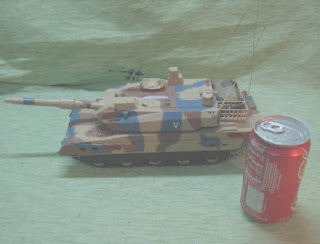
During World War Two Imperial Japan has an infamous reputation of having a formidable and efficient military force. Reluctantly opening its doors to western intervention during the mid 1800’s after more than 200 years of isolationist policy, it quickly immerse itself to the prevailing international political – economics ideas of the time, in less than a hundred years after Commodore Perry’s arrival at Tokyo bay in 1853, Japan have the economy and industrial know-how marginally comparable to western standards that enable it to include itself in the line-up of the most powerful nations of the world by the onset of the 20th century.
When Japan started its conquering push to Southeast Asia expanding World War II (WW2) to the Pacific, Japanese air and seaborne weapons platforms are already established fear factor’s to it would be enemies – except …its Tanks. Unlike its warplanes and battleships which proved to be formidable against its allied counterparts, Imperial Japanese Army (IJA) Tanks was considered as gravely shoddy machines even before the onset of war in the Pacific in the last quarter of 1941. Most Japanese warlords view tank as merely a supporting fiddler to “infantry action” thus most of the tank available during its imperial campaigns are inadequately armed and lightly armored that although it was adequate during its war with the Chinese and Russians prior WW2 by no means it was a match to the standard American tanks it will encounter later in the War. Japan did have foresight on the necessity of tanks on modern warfare, in fact they bought tanks from the France and the United Kingdom to be used as templates for their own self-manufactured war machines, but aircrafts and battleships were given developmental priorty mainly maybe because of the geographical characteristic of the theater it will be involve in. By the time Japan officially started its hostilities with the "Allies"; by the factor of “Tank Force” strenght Japan’s legendary mechanized ground forces was actually a myth, what truly made Japan conquest of Southeast Asia so sweeping in the beginning is its highly disciplined and battle hardened army ....
My father (rip) always brag's to me that he experienced World War II as a boy and would always tell story about his encounters with American Military and how impressive G.I. weaponry are, unlike my mother he rarely talk about the Japanese, so it was quite a surprise for me when dad enthusiastically suggested that I choose a Japanese World War II tank model kit during one weekend shopping trip for school supplies at a popular commercial district, I instinctively reputed his suggestion and bought a German tank model kit instead and only because there is no American tank or aircraft kit available on the shelves.
Since I’ve first started my series of web-blogs a Japanese tank was one of the necessary model in my sentimental subject list, but as always the main reason why I cannot post a subject that I want - when I want it is ... Availability and cost. Early Japanese Tank model kits are specially hard to find in local hobby shops. I was considering building a paper model out of plans found on the web and while I was contemplating on such a project's preparation, manual work, time involved, how old I am, and those pretty young cashiers at the minor-mall, I came across a Radio Controlled (RC) tank toy while browsing the many local shopping sites online, it's not a WW2 era IJA Tank that I was searching for; but nevertheless still I though it illustrate’s Japanese savyness in combining adaptive technology with indigenous design plus I totally avoided building a complicatedly messy cardboard model.
The featured "toy" 1/32 scale replica Tank is a “Japan Ground Self Defense Force” (JGSDF) TYPE -10 MBT (main battle tank), its has fairly good details for a child’s toy and its full function radio controlled with many twinkling lights, but maybe because it was originally intended to entertain an “eight years old” the vehicle is tuned to respond quite exaggeratedly to the controls. It has a infra-red battle system wherein theoretically (if you have two units) you can do battle with another tank by infra-red beams, it has real caterpillar tracks with functioning suspension. Even before I got the toy I had envisioned to repaint it, but doing a modeler style painting process will require dis-assembling the toy thus risk damaging the delicate interior mechanism and electronic circuitry, so I shelved the idea indefinitely and instead opted to do some minor cosmetic coloring and parts modification instead. Except for a commander’s figure and radio transmitter, the toy has no other accessories included so I have to fabricate a mock copula machinegun using eraser blocks, plastic cards, and earbud tubing.
The actual JGSDF TYPE-10 is listed as officially put into service by the Japanese military in 2012, only basic functionality was usually revealed on the many online sources for this MBT, road speeds of up 70 kph , 120 mm smooth bore main guns (NATO standard) with special mentions for its home-developed enhancement in the areas of anti – tank defense and modular armouring system. Tanks, Practically speaking is an obsolete weapon by “First World” Nuclear and smart weapons availability; conventional weapons are however still important and continually developed by advance countries partly as psycho-political weapons for projecting thier nations technological, economic and some may say intellectual strength for the purpose of either intimidation or deterrent from hostile action of a rival entity…this principle is best argued with the famous Latin phrase – “Si vis pacem, para bellum “ or what it says in my knowledge - “ If you covet peace, Prepare for war".
size comparison
"Except for a commander’s figure and radio transmitter, the toy tank set has no other accessories included so I have to fabricate a mock copula machinegun using rubber blocks, clips, plastic cards, and earbud tubings."
1:32 scale TYPE-10 MBT demo Video









 :
: